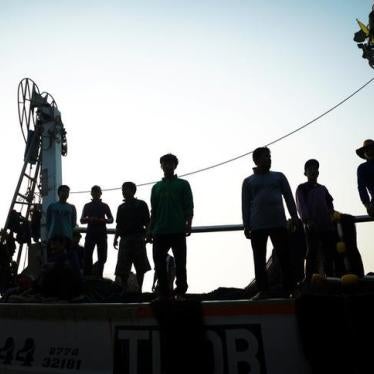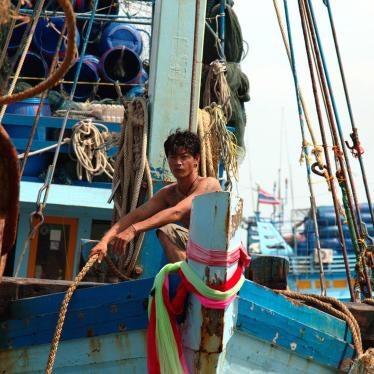Fishing workers, through the very nature of their work, are especially vulnerable to human trafficking as well as forced, bonded and slave labour, operating as they do in isolated and hazardous conditions. To protect this vulnerable group, the International Labour Organization (ILO) has established basic standards of decent work in the fishing industry.
In Thailand, there are an estimated 4.5 million migrant workers with over 222,000 migrant workers in the seafood sector and approximately 71,000 migrant workers on board fishing vessels. Thailand’s seafood exports are valued at over US$5.8 billion annually, making it the third largest seafood exporter in the world. However, the Thai fishing industry has been responsible for systematic illegal, unreported and unregulated (IUU) fishing practices, and pervasive, horrific human rights abuses.
Over the last five years, both the US State Department and European Commission have issued formal warnings to Thailand about its fishing industry. The US sanction came in the form of a downgrade to Tier 3 in the Trafficking in Persons Report, while the European Commission issued a ‘yellow card’ warning to Thailand on combatting IUU fishing that could lead to a ban on importing Thai seafood products into the European Union. Several non-governmental organizations and prominent international media outlets (such as the Associated Press, New York Times, Guardian, and others) also published critical reports and articles exposing abuses in the Thai fishing industry. The result of this pressure is the Royal Thai Government set about reforming the industry to address the issues of human trafficking, and forced, bonded and slave labour.
Ratifying and implementing the ILO’s Work in Fishing Convention (C188) would ensure vulnerable fishing workers are sufficiently protected while they work in one of the most dangerous working environments in the world. The Convention establishes minimum labor standards to improve the safety, health and medical care for workers on board fishing vessels, as well as ensuring they have the protection of a written work agreement and the same social security protections as national workers. The Royal Thai Government has already taken several important steps towards ratification of C188, including holding an initial tripartite meeting as well as numerous public hearings. These consultations have paved the way for the successful ratification of this critical convention in the near future.
We respectfully urge the Royal Thai Government and the Ministry of Labor to pursue a robust and ambitious approach to ensure ratification of C188 before the end of 2018. Efforts to reject the C188 by the National Fishing Association of Thailand (NFAT) are sadly unsurprising given NFAT’s reneging on its previous promises to cooperate with the Royal Thai Government to eliminate human and labor rights abuses in the fishing industry. Specifically, we call on the Royal Thai Government to ensure the key provisions of the Convention are included in any final legislation that the Royal Thai Government adopts.
We strongly recommend that protections be preserved that provide for decent working and living conditions for the fishers onboard vessels and social security protections. These provisions are vital in preventing workers from being exploited by unscrupulous employers who pay sub-minimum wages, refuse to ensure overtime is voluntary and compensated, and engage in debt bondage and forced labor. Ensuring fishers are included fully in the social security system is critical to protect them if they suffer an occupational accident or an illness. Furthermore, including these provisions will grant workers much needed statutory social security benefits. Other core principles that need to be maintained in the legislation include ensuring a minimum age for fishers, payment of minimum wages, and enforcing limits on working hours. Current Thai labor law already restricts children under age 18 from working in dirty and dangerous work, in line with ILO Convention No. 182 on the Worst Forms of Child Labour, which Thailand has ratified. NFAT’s continuing demand for exemptions to the child labor laws in the abusive Thai fishing industry demonstrates shocking disregard for the safety of children. The Royal Thai Government should defend its principled stance and reject any proposals to allow 16-year-olds to work on fishing vessels under any circumstances.
Discussions between Thailand and migrant worker origin countries (such as Myanmar, Cambodia, Lao PDR, and Vietnam) aimed at formulating new Memorandums of Understanding between the respective parties have not succeeded in addressing the current labour shortage in the Thai fishing industry. The primary reason is self-evident – the Thai fishing industry has a well-deserved reputation for serious and pervasive labor rights abuses. It is little wonder that several origin countries are resistant to formalizing a flow of workers into Thailand to work on fishing vessels without any certainty about the legal protections and enforcement provided to their nationals going to work on fishing boats. One way of addressing these issues would be to expedite ratification of C188 and formalize a set of labor and occupational protections that would reassure origin country governments that labor standards on board Thai fishing vessels meet international standards. With adequate protections in place for fishing workers, Thailand would be in an excellent position to persuade neighboring governments to allow their nationals to work in the fishing sector, thus addressing the current labour shortage.
We are ready to work with the Ministry of Labour, industry representatives, fishers and their representatives, and civil society organizations to ensure that the C188 ratification process and domestic legislation is as effective and as far-reaching as possible. We believe the ratification and full implementation of C188 is one of the most tangible measures available to reduce the likelihood of workers falling victim to human trafficking, forced labour, and exploitative working conditions. For this reason, we urge the Ministry of Labor to persevere in fulfilling our mutually shared goal of protecting workers’ rights in Thailand’s fishing industry.
The ratification of C188 would allow the Royal Thai Government to send a credible and powerful message to the international community that Thailand is firmly committed to eliminating human trafficking, forced labour and other forms of exploitation from its fishing industry. Adopting C188 would also give seafood buyers and retailers around the world greater confidence that Thai seafood is ethically sourced.
For this reason, the undersigned groups urge individuals, businesses, institutions, and governments around the world to call on the Royal Thai Government to demonstrate its leadership in protecting fishers as well as elevating working and living conditions on Thai vessels through the ratification and implementation of this pioneering convention.
Sincerely,
Anti-Slavery International
Business and Human Rights Resource Center
CENTRAL
Conservation International
Environmental Justice Foundation (EJF)
Human Rights and Development Foundation (HRDF) Human Rights Watch
Humanity United Action
International Labor Rights Forum (ILRF)
FinnWatch
FishWise
Focus on the Global South
Fortify Rights
Foundation for Education and Development (FED)
Freedom Fund
Freedom United
Green America
Greenpeace Southeast Asia
Labor Safe
MAP Foundation
Mekong Migration Network (MMN)
Migrant Working Group (MWG)
Migrant Workers Rights Network (MWRN)
Raks Thai Foundation
Slave Free Seas
Stella Maris Seafarers’ Centre
Stop The Traffik Coalition
Uniting Church in Australia, Synod of Victoria and Tasmania Verité








